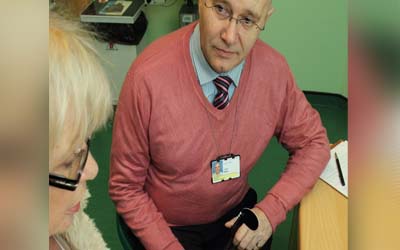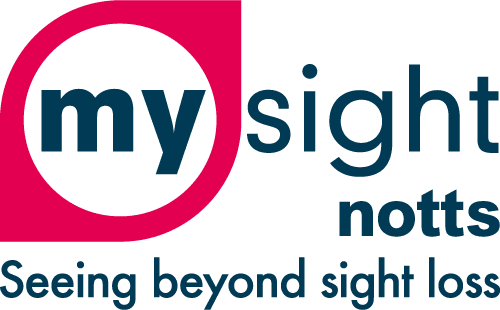Gina
“After a routine eye test at my local opticians I was prescribed new glasses, but when I got them I thought they weren’t right. Everything looked wobbly and I was convinced there was a dirty mark in the middle of the lens. After several attempts at cleaning them, I went back to the optician and asked them to check my glasses.
“The optician suggested a second eye test, I said I’d not long had one, but as they offered it for free, I thought I might as well. The optician referred me to the hospital eye clinic for further tests.
“I was convinced my new glasses were faulty and thought trekking to the hospital was a waste of time, but I went along with it. I’d expected to see a hospital optician but the macular clinic at the Queen’s Medical Centre looked very different from my high street opticians. For starters, it was full of people much older than me and it looked like a proper hospital clinic with nurses in uniform – it then dawned on me that something might be wrong. First I had a scan then the nurse said the consultant wanted a more detailed scan and I would need to have dye injected into my arm through a canular so the consultant could take a better look at the back of my eye. I’m terrified of needles; I’d never expected to see a consultant and suddenly it felt like a serious medical procedure. I felt the panic start to rise and I began to wish I’d asked my husband to stay as I felt quite alone and frightened.
“The consultant said the scan showed I’d had a bleed at the back of my eyes. I couldn’t believe what I was hearing, I said my eyes hadn’t been bleeding, I’d have noticed surely? The consultant said I would need regular injections in my eyes, that there was no cure but they would try to manage the disease and slow it down.
“I felt sick, I heard what he was saying but I couldn’t take it in; it was like I was listening to him from inside a bubble. I remember asking what it meant and he said I had lost some sight but the treatment would hopefully slow my sight loss down and I wouldn’t go totally blind. I remember thinking ‘what are you talking about? I came in with a faulty pair of glasses and now you’re telling me I’m at risk of going blind! “I can’t remember leaving the clinic, but I do remember getting into my husband’s car and sobbing.
“Over the next few weeks, we started to read the leaflets we’d been given and to search the internet for information about macular degeneration. The more I read the more I could see my exact symptoms being described.
“I felt really angry at the lack of support to deal with such devastating news and I couldn’t believe this was happening to me in my 40s. “The leaflets I’d been given by the consultant focused on the medical side of things but there was nothing about where I could find help, I seemed to be left entirely on my own to deal with it all.
While at the eye clinic one day, I picked up different leaflets from a desk on my way out. I didn’t read them at first because I thought it would be too depressing – some of them were from the Royal National Institute of the Blind and I didn’t want to associate myself with blindness.
“Some of the leaflets were from My Sight Notts, I just remember the people in the pictures looked happy and they were written in a language I could understand. “I went back to the desk I’d found the leaflets the following week and that’s when I met Chris the Eye Clinic Liaison Officer (ECLO). Finding that leaflet and talking to Chris was like being thrown a lifeline when I needed it most. “The Eye Clinic Liaison Officer is always there for me to talk to; I feel listened to and understood by him. I’ve sat and cried with him, laughed with him and even ranted with him, he’s like a calm place in a huge storm.
“I’m not sure where I’d be without the support of My Sight Notts and its eye clinic service, I still have difficulties to overcome, but with his help, I’ve come to understand that although some doors feel like they’re shut, they’re not bolted and with the right advice I will find a way through. Life doesn’t stop, it changes and I need support to adapt and move on.”


